Analysis of Communication Strategies: Mr. Fishy Restaurant Report
VerifiedAdded on 2021/02/19
|7
|2038
|21
Report
AI Summary
This report provides an in-depth analysis of business communication strategies and practices, specifically focusing on the case of Mr. Fishy, a fish and chips restaurant. The report examines the purposes and principles behind various forms of organizational communication, including oral and written methods. It explores principles of effective communication to enhance practices within the company, such as simplicity, attentiveness, and accuracy. The report evaluates the communication practices at Mr. Fishy, highlighting the advantages and disadvantages of both oral and written communication methods, and discusses the barriers faced by employees. The analysis includes a discussion of how Mr. Fishy utilizes communication to meet business objectives, maintain customer relations, and keep records. The report concludes by summarizing the importance of effective communication for the restaurant's operational efficiency and overall success.
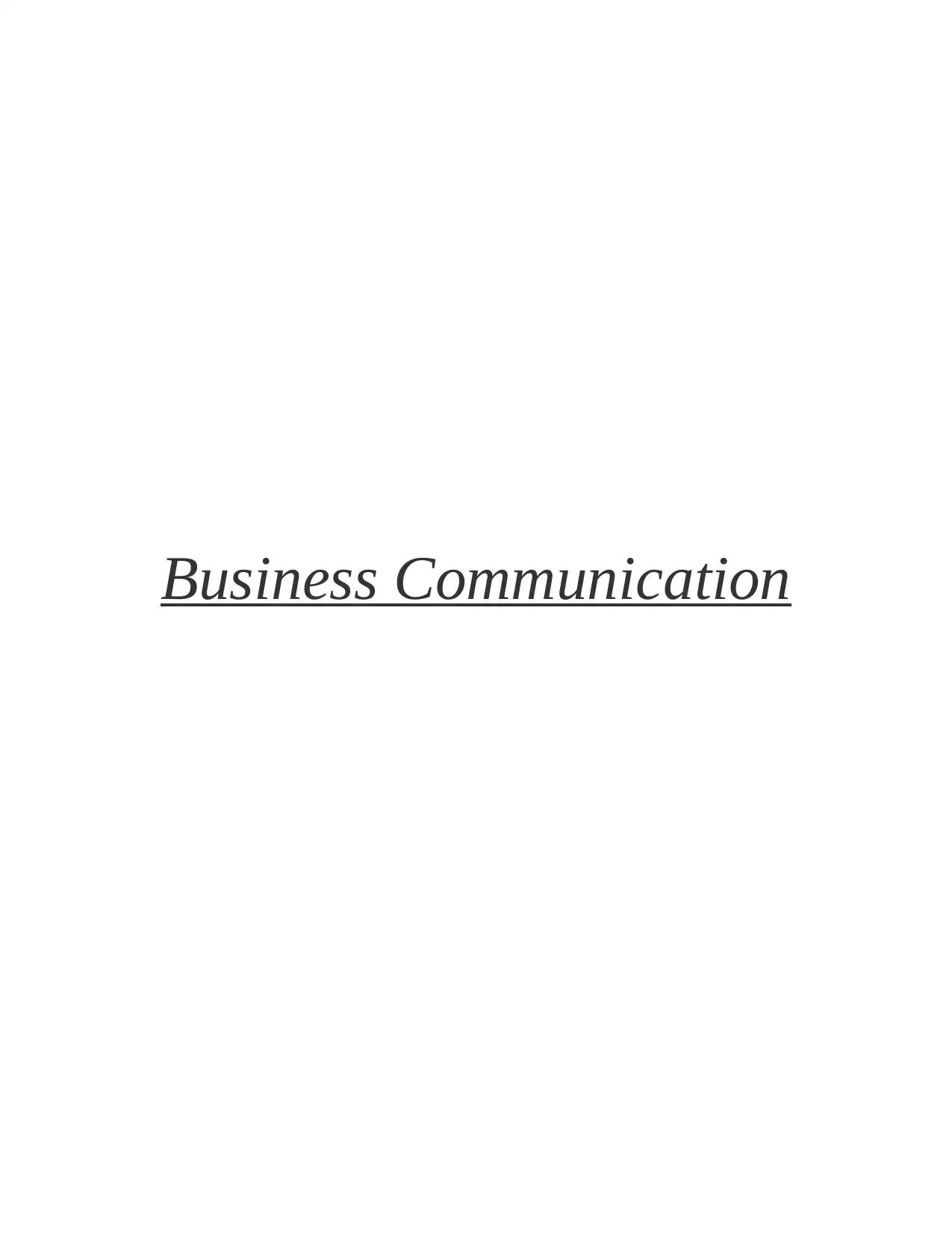
Business Communication
Paraphrase This Document
Need a fresh take? Get an instant paraphrase of this document with our AI Paraphraser
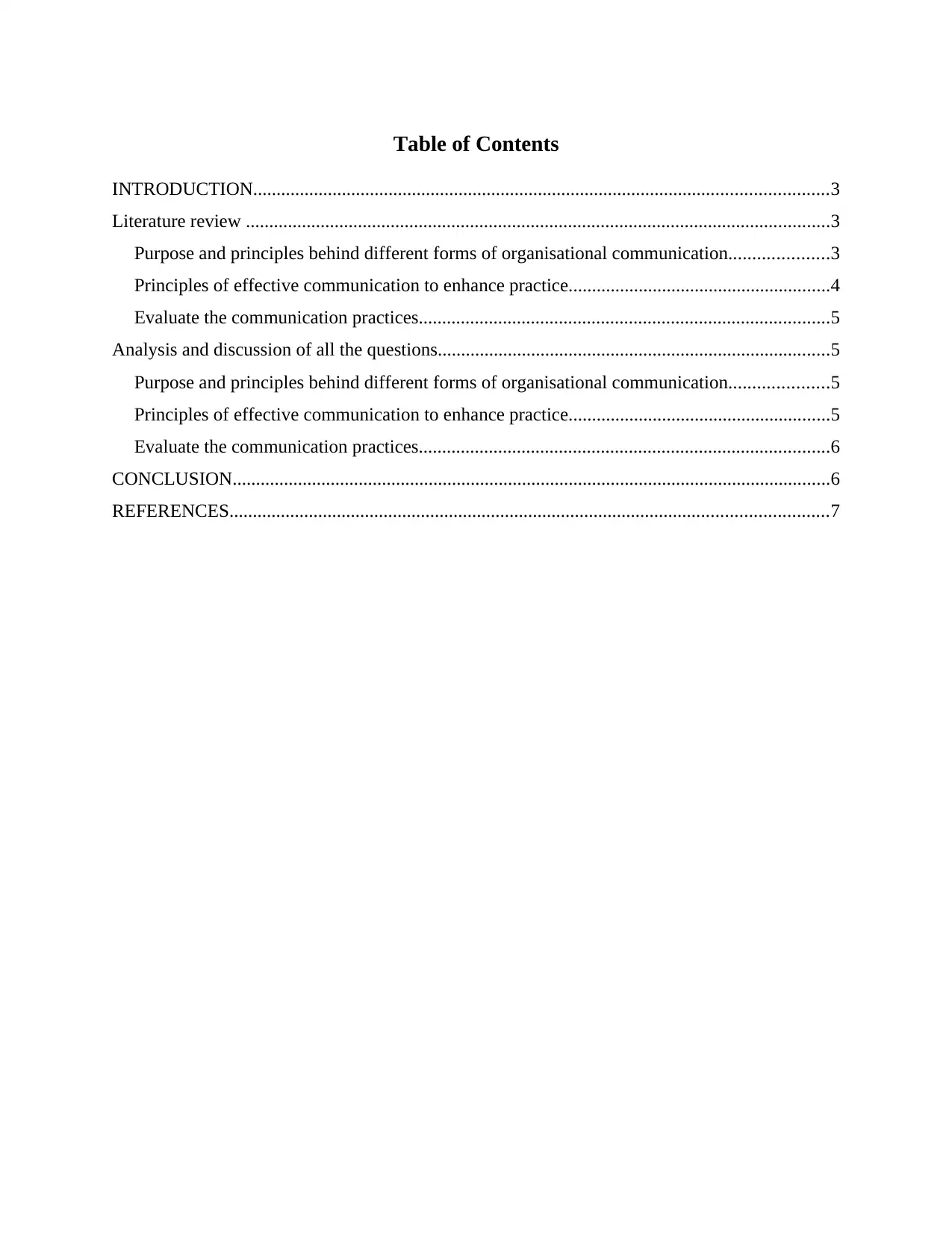
Table of Contents
INTRODUCTION...........................................................................................................................3
Literature review .............................................................................................................................3
Purpose and principles behind different forms of organisational communication.....................3
Principles of effective communication to enhance practice........................................................4
Evaluate the communication practices........................................................................................5
Analysis and discussion of all the questions....................................................................................5
Purpose and principles behind different forms of organisational communication.....................5
Principles of effective communication to enhance practice........................................................5
Evaluate the communication practices........................................................................................6
CONCLUSION................................................................................................................................6
REFERENCES................................................................................................................................7
INTRODUCTION...........................................................................................................................3
Literature review .............................................................................................................................3
Purpose and principles behind different forms of organisational communication.....................3
Principles of effective communication to enhance practice........................................................4
Evaluate the communication practices........................................................................................5
Analysis and discussion of all the questions....................................................................................5
Purpose and principles behind different forms of organisational communication.....................5
Principles of effective communication to enhance practice........................................................5
Evaluate the communication practices........................................................................................6
CONCLUSION................................................................................................................................6
REFERENCES................................................................................................................................7
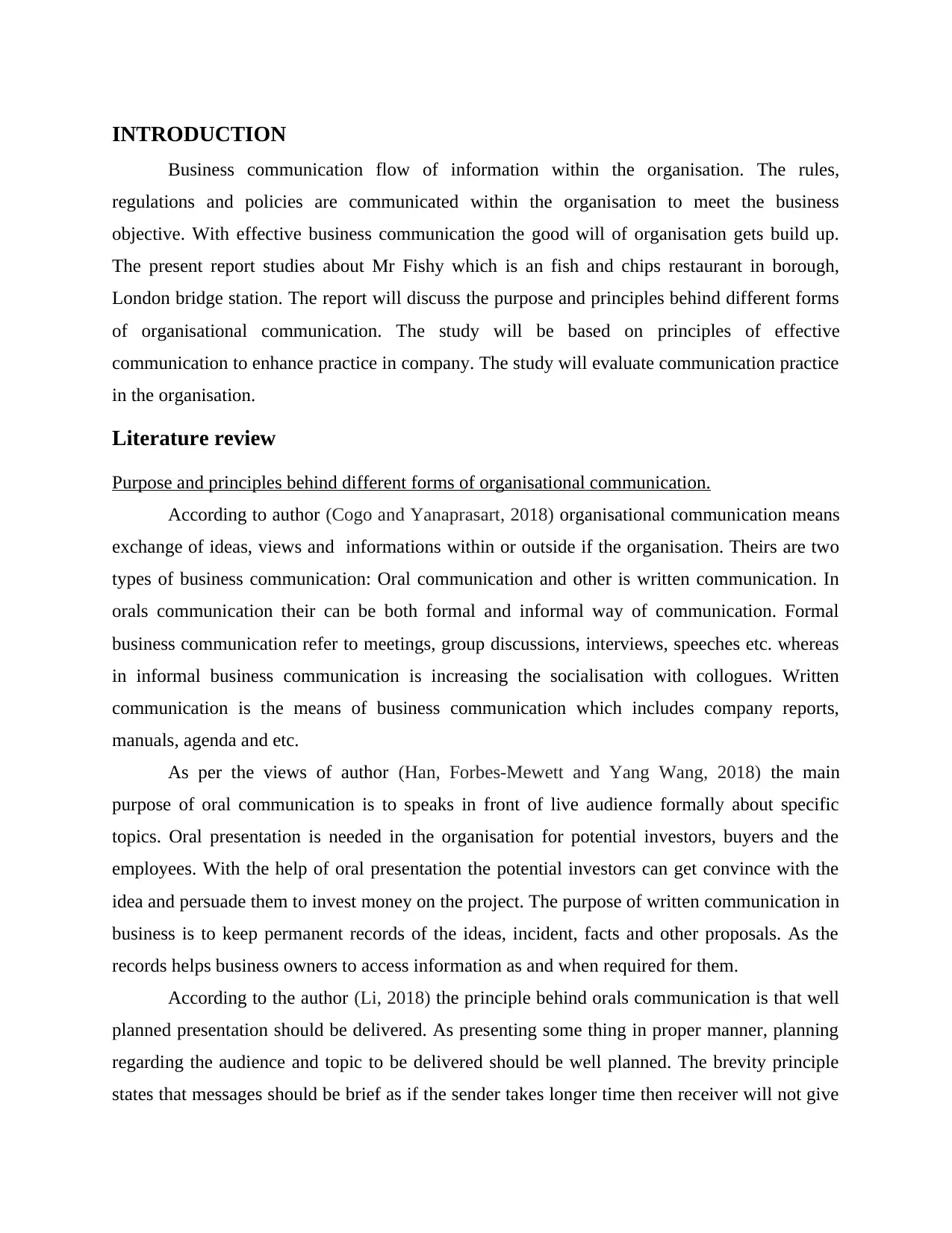
INTRODUCTION
Business communication flow of information within the organisation. The rules,
regulations and policies are communicated within the organisation to meet the business
objective. With effective business communication the good will of organisation gets build up.
The present report studies about Mr Fishy which is an fish and chips restaurant in borough,
London bridge station. The report will discuss the purpose and principles behind different forms
of organisational communication. The study will be based on principles of effective
communication to enhance practice in company. The study will evaluate communication practice
in the organisation.
Literature review
Purpose and principles behind different forms of organisational communication.
According to author (Cogo and Yanaprasart, 2018) organisational communication means
exchange of ideas, views and informations within or outside if the organisation. Theirs are two
types of business communication: Oral communication and other is written communication. In
orals communication their can be both formal and informal way of communication. Formal
business communication refer to meetings, group discussions, interviews, speeches etc. whereas
in informal business communication is increasing the socialisation with collogues. Written
communication is the means of business communication which includes company reports,
manuals, agenda and etc.
As per the views of author (Han, Forbes-Mewett and Yang Wang, 2018) the main
purpose of oral communication is to speaks in front of live audience formally about specific
topics. Oral presentation is needed in the organisation for potential investors, buyers and the
employees. With the help of oral presentation the potential investors can get convince with the
idea and persuade them to invest money on the project. The purpose of written communication in
business is to keep permanent records of the ideas, incident, facts and other proposals. As the
records helps business owners to access information as and when required for them.
According to the author (Li, 2018) the principle behind orals communication is that well
planned presentation should be delivered. As presenting some thing in proper manner, planning
regarding the audience and topic to be delivered should be well planned. The brevity principle
states that messages should be brief as if the sender takes longer time then receiver will not give
Business communication flow of information within the organisation. The rules,
regulations and policies are communicated within the organisation to meet the business
objective. With effective business communication the good will of organisation gets build up.
The present report studies about Mr Fishy which is an fish and chips restaurant in borough,
London bridge station. The report will discuss the purpose and principles behind different forms
of organisational communication. The study will be based on principles of effective
communication to enhance practice in company. The study will evaluate communication practice
in the organisation.
Literature review
Purpose and principles behind different forms of organisational communication.
According to author (Cogo and Yanaprasart, 2018) organisational communication means
exchange of ideas, views and informations within or outside if the organisation. Theirs are two
types of business communication: Oral communication and other is written communication. In
orals communication their can be both formal and informal way of communication. Formal
business communication refer to meetings, group discussions, interviews, speeches etc. whereas
in informal business communication is increasing the socialisation with collogues. Written
communication is the means of business communication which includes company reports,
manuals, agenda and etc.
As per the views of author (Han, Forbes-Mewett and Yang Wang, 2018) the main
purpose of oral communication is to speaks in front of live audience formally about specific
topics. Oral presentation is needed in the organisation for potential investors, buyers and the
employees. With the help of oral presentation the potential investors can get convince with the
idea and persuade them to invest money on the project. The purpose of written communication in
business is to keep permanent records of the ideas, incident, facts and other proposals. As the
records helps business owners to access information as and when required for them.
According to the author (Li, 2018) the principle behind orals communication is that well
planned presentation should be delivered. As presenting some thing in proper manner, planning
regarding the audience and topic to be delivered should be well planned. The brevity principle
states that messages should be brief as if the sender takes longer time then receiver will not give
⊘ This is a preview!⊘
Do you want full access?
Subscribe today to unlock all pages.

Trusted by 1+ million students worldwide
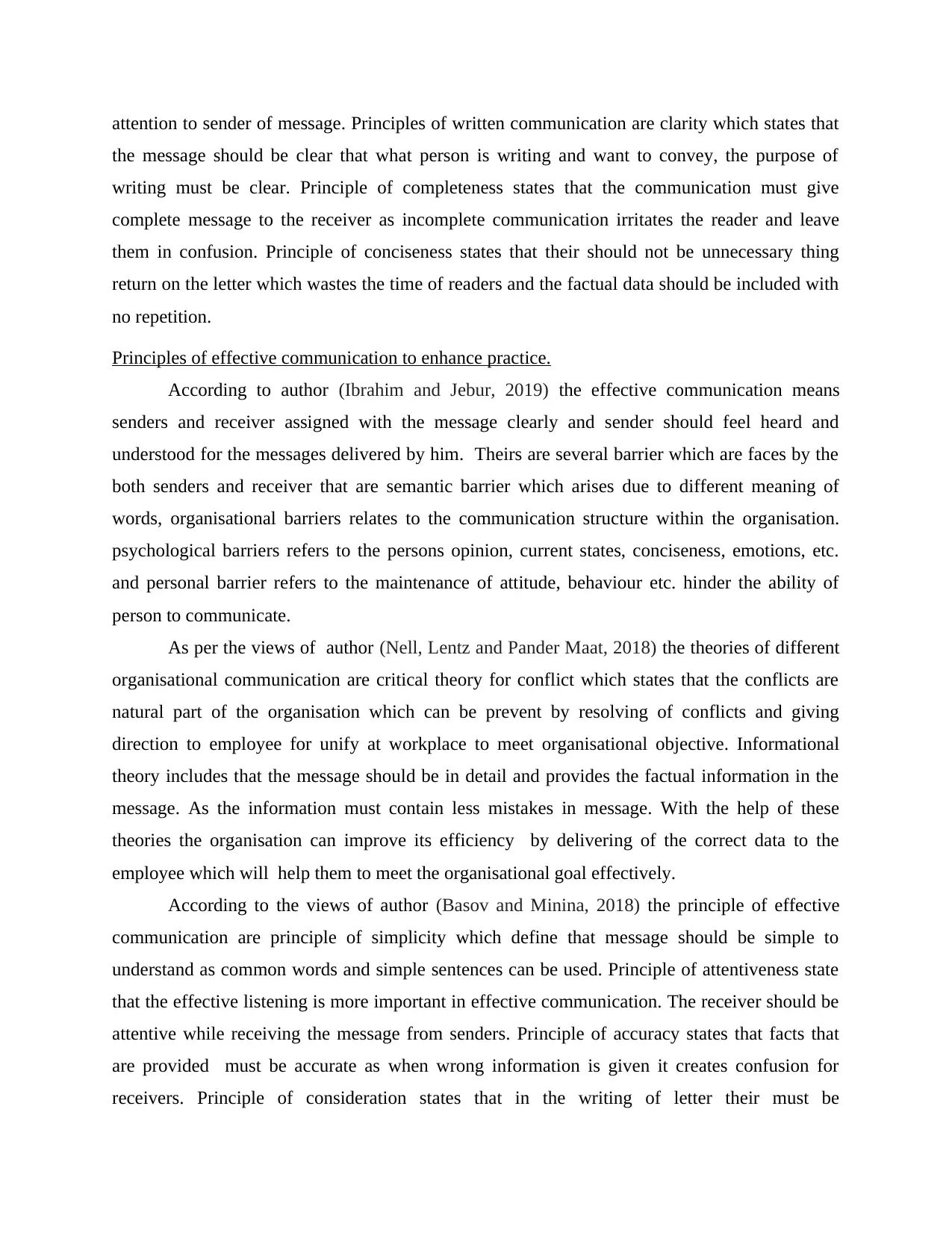
attention to sender of message. Principles of written communication are clarity which states that
the message should be clear that what person is writing and want to convey, the purpose of
writing must be clear. Principle of completeness states that the communication must give
complete message to the receiver as incomplete communication irritates the reader and leave
them in confusion. Principle of conciseness states that their should not be unnecessary thing
return on the letter which wastes the time of readers and the factual data should be included with
no repetition.
Principles of effective communication to enhance practice.
According to author (Ibrahim and Jebur, 2019) the effective communication means
senders and receiver assigned with the message clearly and sender should feel heard and
understood for the messages delivered by him. Theirs are several barrier which are faces by the
both senders and receiver that are semantic barrier which arises due to different meaning of
words, organisational barriers relates to the communication structure within the organisation.
psychological barriers refers to the persons opinion, current states, conciseness, emotions, etc.
and personal barrier refers to the maintenance of attitude, behaviour etc. hinder the ability of
person to communicate.
As per the views of author (Nell, Lentz and Pander Maat, 2018) the theories of different
organisational communication are critical theory for conflict which states that the conflicts are
natural part of the organisation which can be prevent by resolving of conflicts and giving
direction to employee for unify at workplace to meet organisational objective. Informational
theory includes that the message should be in detail and provides the factual information in the
message. As the information must contain less mistakes in message. With the help of these
theories the organisation can improve its efficiency by delivering of the correct data to the
employee which will help them to meet the organisational goal effectively.
According to the views of author (Basov and Minina, 2018) the principle of effective
communication are principle of simplicity which define that message should be simple to
understand as common words and simple sentences can be used. Principle of attentiveness state
that the effective listening is more important in effective communication. The receiver should be
attentive while receiving the message from senders. Principle of accuracy states that facts that
are provided must be accurate as when wrong information is given it creates confusion for
receivers. Principle of consideration states that in the writing of letter their must be
the message should be clear that what person is writing and want to convey, the purpose of
writing must be clear. Principle of completeness states that the communication must give
complete message to the receiver as incomplete communication irritates the reader and leave
them in confusion. Principle of conciseness states that their should not be unnecessary thing
return on the letter which wastes the time of readers and the factual data should be included with
no repetition.
Principles of effective communication to enhance practice.
According to author (Ibrahim and Jebur, 2019) the effective communication means
senders and receiver assigned with the message clearly and sender should feel heard and
understood for the messages delivered by him. Theirs are several barrier which are faces by the
both senders and receiver that are semantic barrier which arises due to different meaning of
words, organisational barriers relates to the communication structure within the organisation.
psychological barriers refers to the persons opinion, current states, conciseness, emotions, etc.
and personal barrier refers to the maintenance of attitude, behaviour etc. hinder the ability of
person to communicate.
As per the views of author (Nell, Lentz and Pander Maat, 2018) the theories of different
organisational communication are critical theory for conflict which states that the conflicts are
natural part of the organisation which can be prevent by resolving of conflicts and giving
direction to employee for unify at workplace to meet organisational objective. Informational
theory includes that the message should be in detail and provides the factual information in the
message. As the information must contain less mistakes in message. With the help of these
theories the organisation can improve its efficiency by delivering of the correct data to the
employee which will help them to meet the organisational goal effectively.
According to the views of author (Basov and Minina, 2018) the principle of effective
communication are principle of simplicity which define that message should be simple to
understand as common words and simple sentences can be used. Principle of attentiveness state
that the effective listening is more important in effective communication. The receiver should be
attentive while receiving the message from senders. Principle of accuracy states that facts that
are provided must be accurate as when wrong information is given it creates confusion for
receivers. Principle of consideration states that in the writing of letter their must be
Paraphrase This Document
Need a fresh take? Get an instant paraphrase of this document with our AI Paraphraser
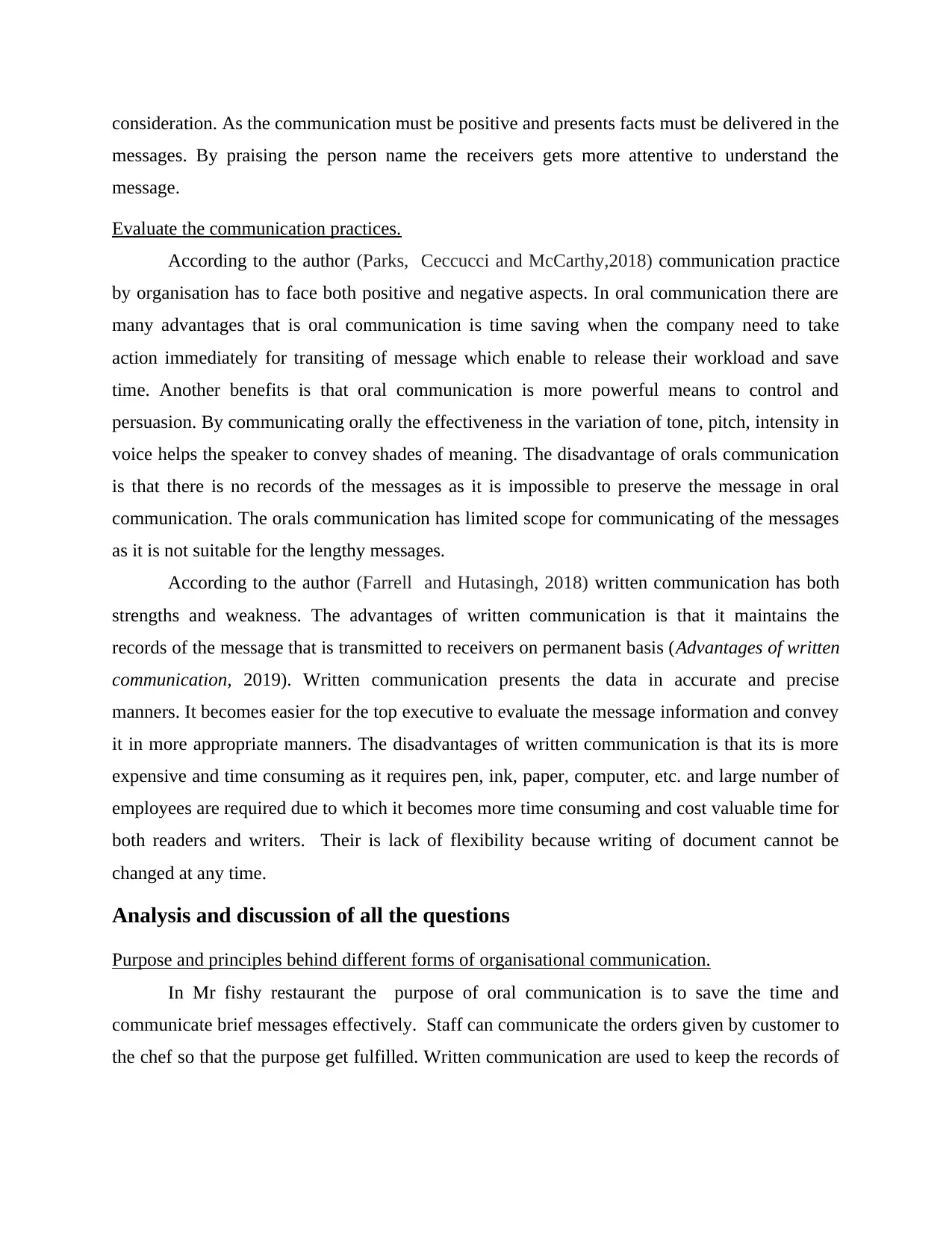
consideration. As the communication must be positive and presents facts must be delivered in the
messages. By praising the person name the receivers gets more attentive to understand the
message.
Evaluate the communication practices.
According to the author (Parks, Ceccucci and McCarthy,2018) communication practice
by organisation has to face both positive and negative aspects. In oral communication there are
many advantages that is oral communication is time saving when the company need to take
action immediately for transiting of message which enable to release their workload and save
time. Another benefits is that oral communication is more powerful means to control and
persuasion. By communicating orally the effectiveness in the variation of tone, pitch, intensity in
voice helps the speaker to convey shades of meaning. The disadvantage of orals communication
is that there is no records of the messages as it is impossible to preserve the message in oral
communication. The orals communication has limited scope for communicating of the messages
as it is not suitable for the lengthy messages.
According to the author (Farrell and Hutasingh, 2018) written communication has both
strengths and weakness. The advantages of written communication is that it maintains the
records of the message that is transmitted to receivers on permanent basis (Advantages of written
communication, 2019). Written communication presents the data in accurate and precise
manners. It becomes easier for the top executive to evaluate the message information and convey
it in more appropriate manners. The disadvantages of written communication is that its is more
expensive and time consuming as it requires pen, ink, paper, computer, etc. and large number of
employees are required due to which it becomes more time consuming and cost valuable time for
both readers and writers. Their is lack of flexibility because writing of document cannot be
changed at any time.
Analysis and discussion of all the questions
Purpose and principles behind different forms of organisational communication.
In Mr fishy restaurant the purpose of oral communication is to save the time and
communicate brief messages effectively. Staff can communicate the orders given by customer to
the chef so that the purpose get fulfilled. Written communication are used to keep the records of
messages. By praising the person name the receivers gets more attentive to understand the
message.
Evaluate the communication practices.
According to the author (Parks, Ceccucci and McCarthy,2018) communication practice
by organisation has to face both positive and negative aspects. In oral communication there are
many advantages that is oral communication is time saving when the company need to take
action immediately for transiting of message which enable to release their workload and save
time. Another benefits is that oral communication is more powerful means to control and
persuasion. By communicating orally the effectiveness in the variation of tone, pitch, intensity in
voice helps the speaker to convey shades of meaning. The disadvantage of orals communication
is that there is no records of the messages as it is impossible to preserve the message in oral
communication. The orals communication has limited scope for communicating of the messages
as it is not suitable for the lengthy messages.
According to the author (Farrell and Hutasingh, 2018) written communication has both
strengths and weakness. The advantages of written communication is that it maintains the
records of the message that is transmitted to receivers on permanent basis (Advantages of written
communication, 2019). Written communication presents the data in accurate and precise
manners. It becomes easier for the top executive to evaluate the message information and convey
it in more appropriate manners. The disadvantages of written communication is that its is more
expensive and time consuming as it requires pen, ink, paper, computer, etc. and large number of
employees are required due to which it becomes more time consuming and cost valuable time for
both readers and writers. Their is lack of flexibility because writing of document cannot be
changed at any time.
Analysis and discussion of all the questions
Purpose and principles behind different forms of organisational communication.
In Mr fishy restaurant the purpose of oral communication is to save the time and
communicate brief messages effectively. Staff can communicate the orders given by customer to
the chef so that the purpose get fulfilled. Written communication are used to keep the records of
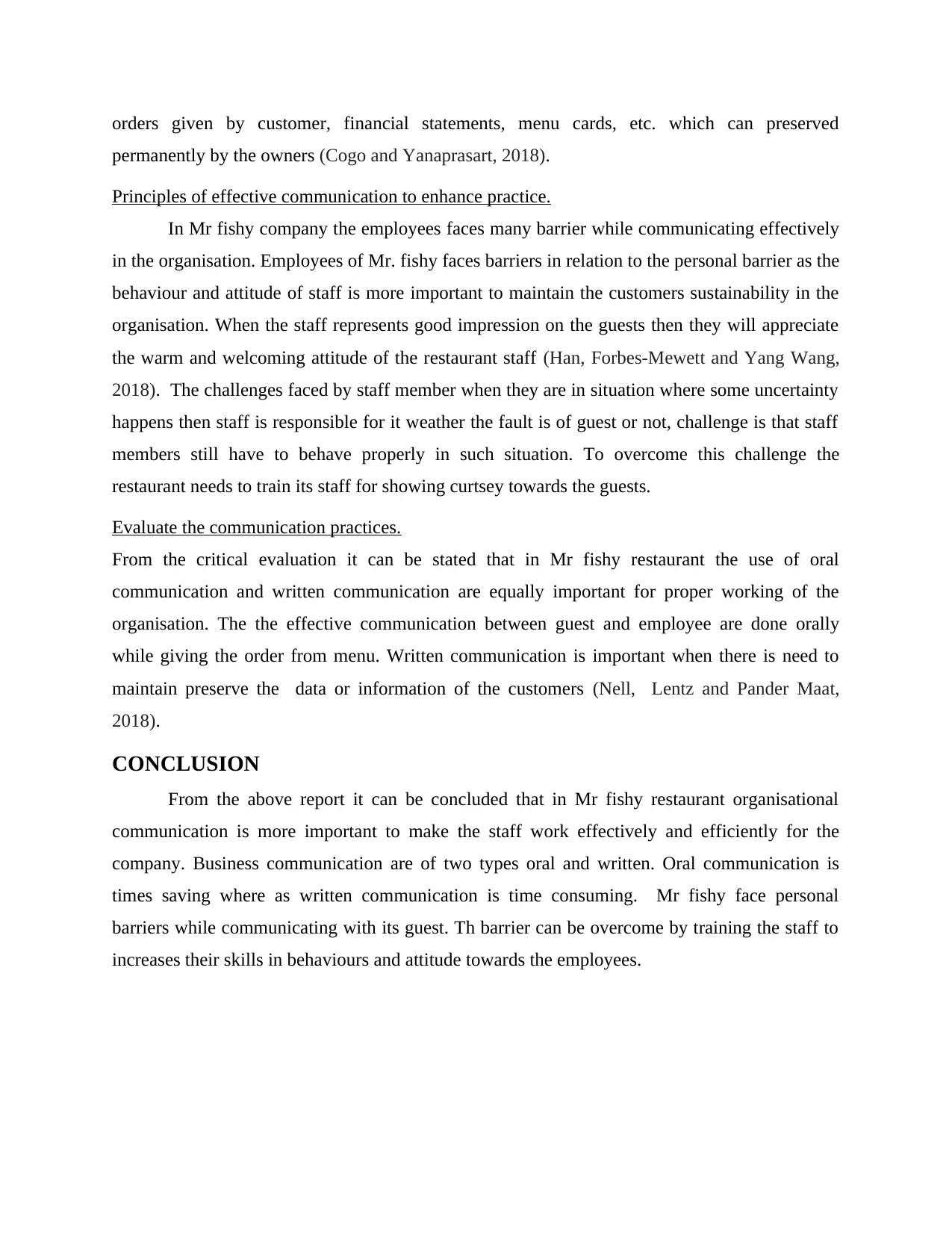
orders given by customer, financial statements, menu cards, etc. which can preserved
permanently by the owners (Cogo and Yanaprasart, 2018).
Principles of effective communication to enhance practice.
In Mr fishy company the employees faces many barrier while communicating effectively
in the organisation. Employees of Mr. fishy faces barriers in relation to the personal barrier as the
behaviour and attitude of staff is more important to maintain the customers sustainability in the
organisation. When the staff represents good impression on the guests then they will appreciate
the warm and welcoming attitude of the restaurant staff (Han, Forbes-Mewett and Yang Wang,
2018). The challenges faced by staff member when they are in situation where some uncertainty
happens then staff is responsible for it weather the fault is of guest or not, challenge is that staff
members still have to behave properly in such situation. To overcome this challenge the
restaurant needs to train its staff for showing curtsey towards the guests.
Evaluate the communication practices.
From the critical evaluation it can be stated that in Mr fishy restaurant the use of oral
communication and written communication are equally important for proper working of the
organisation. The the effective communication between guest and employee are done orally
while giving the order from menu. Written communication is important when there is need to
maintain preserve the data or information of the customers (Nell, Lentz and Pander Maat,
2018).
CONCLUSION
From the above report it can be concluded that in Mr fishy restaurant organisational
communication is more important to make the staff work effectively and efficiently for the
company. Business communication are of two types oral and written. Oral communication is
times saving where as written communication is time consuming. Mr fishy face personal
barriers while communicating with its guest. Th barrier can be overcome by training the staff to
increases their skills in behaviours and attitude towards the employees.
permanently by the owners (Cogo and Yanaprasart, 2018).
Principles of effective communication to enhance practice.
In Mr fishy company the employees faces many barrier while communicating effectively
in the organisation. Employees of Mr. fishy faces barriers in relation to the personal barrier as the
behaviour and attitude of staff is more important to maintain the customers sustainability in the
organisation. When the staff represents good impression on the guests then they will appreciate
the warm and welcoming attitude of the restaurant staff (Han, Forbes-Mewett and Yang Wang,
2018). The challenges faced by staff member when they are in situation where some uncertainty
happens then staff is responsible for it weather the fault is of guest or not, challenge is that staff
members still have to behave properly in such situation. To overcome this challenge the
restaurant needs to train its staff for showing curtsey towards the guests.
Evaluate the communication practices.
From the critical evaluation it can be stated that in Mr fishy restaurant the use of oral
communication and written communication are equally important for proper working of the
organisation. The the effective communication between guest and employee are done orally
while giving the order from menu. Written communication is important when there is need to
maintain preserve the data or information of the customers (Nell, Lentz and Pander Maat,
2018).
CONCLUSION
From the above report it can be concluded that in Mr fishy restaurant organisational
communication is more important to make the staff work effectively and efficiently for the
company. Business communication are of two types oral and written. Oral communication is
times saving where as written communication is time consuming. Mr fishy face personal
barriers while communicating with its guest. Th barrier can be overcome by training the staff to
increases their skills in behaviours and attitude towards the employees.
⊘ This is a preview!⊘
Do you want full access?
Subscribe today to unlock all pages.

Trusted by 1+ million students worldwide
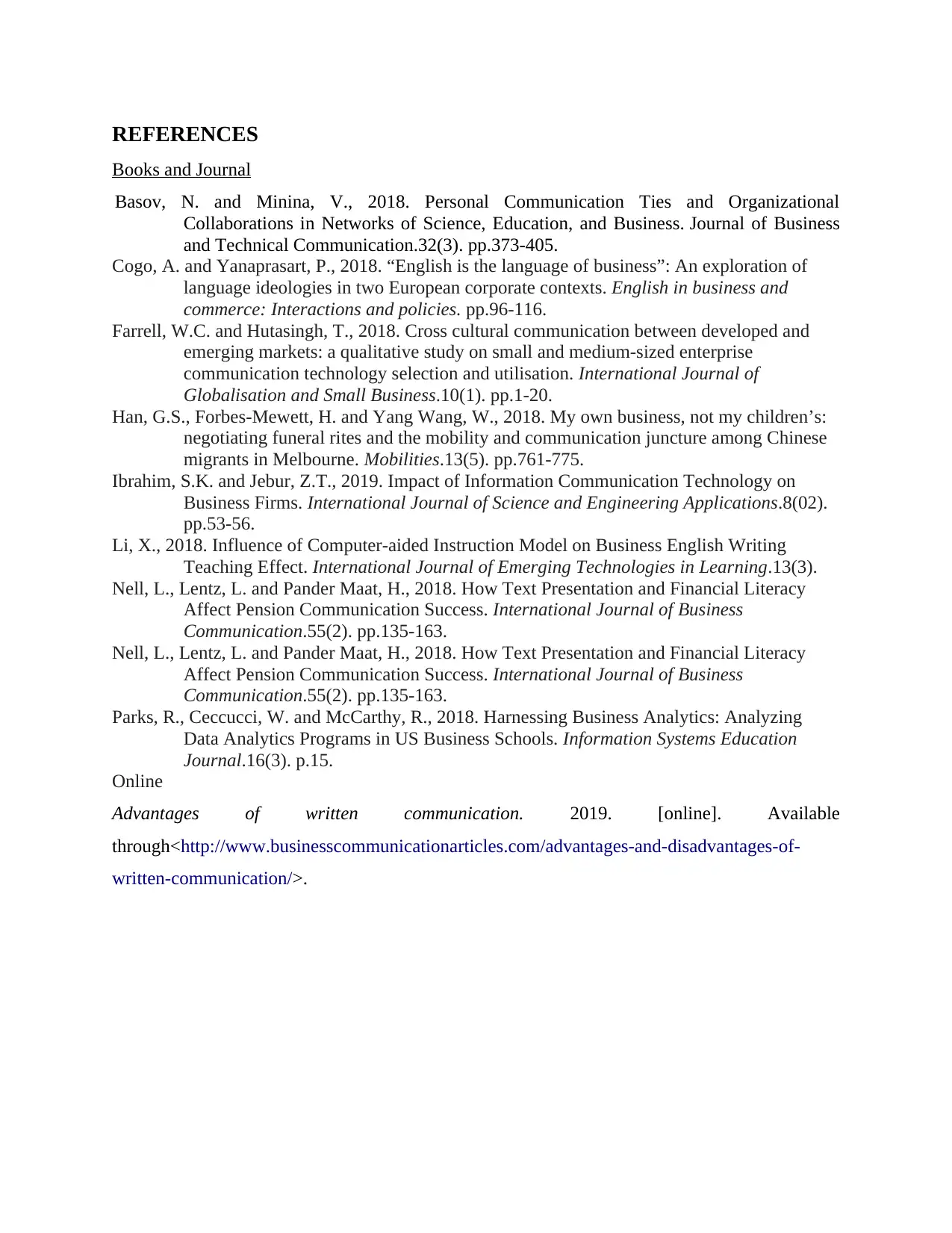
REFERENCES
Books and Journal
Basov, N. and Minina, V., 2018. Personal Communication Ties and Organizational
Collaborations in Networks of Science, Education, and Business. Journal of Business
and Technical Communication.32(3). pp.373-405.
Cogo, A. and Yanaprasart, P., 2018. “English is the language of business”: An exploration of
language ideologies in two European corporate contexts. English in business and
commerce: Interactions and policies. pp.96-116.
Farrell, W.C. and Hutasingh, T., 2018. Cross cultural communication between developed and
emerging markets: a qualitative study on small and medium-sized enterprise
communication technology selection and utilisation. International Journal of
Globalisation and Small Business.10(1). pp.1-20.
Han, G.S., Forbes-Mewett, H. and Yang Wang, W., 2018. My own business, not my children’s:
negotiating funeral rites and the mobility and communication juncture among Chinese
migrants in Melbourne. Mobilities.13(5). pp.761-775.
Ibrahim, S.K. and Jebur, Z.T., 2019. Impact of Information Communication Technology on
Business Firms. International Journal of Science and Engineering Applications.8(02).
pp.53-56.
Li, X., 2018. Influence of Computer-aided Instruction Model on Business English Writing
Teaching Effect. International Journal of Emerging Technologies in Learning.13(3).
Nell, L., Lentz, L. and Pander Maat, H., 2018. How Text Presentation and Financial Literacy
Affect Pension Communication Success. International Journal of Business
Communication.55(2). pp.135-163.
Nell, L., Lentz, L. and Pander Maat, H., 2018. How Text Presentation and Financial Literacy
Affect Pension Communication Success. International Journal of Business
Communication.55(2). pp.135-163.
Parks, R., Ceccucci, W. and McCarthy, R., 2018. Harnessing Business Analytics: Analyzing
Data Analytics Programs in US Business Schools. Information Systems Education
Journal.16(3). p.15.
Online
Advantages of written communication. 2019. [online]. Available
through<http://www.businesscommunicationarticles.com/advantages-and-disadvantages-of-
written-communication/>.
Books and Journal
Basov, N. and Minina, V., 2018. Personal Communication Ties and Organizational
Collaborations in Networks of Science, Education, and Business. Journal of Business
and Technical Communication.32(3). pp.373-405.
Cogo, A. and Yanaprasart, P., 2018. “English is the language of business”: An exploration of
language ideologies in two European corporate contexts. English in business and
commerce: Interactions and policies. pp.96-116.
Farrell, W.C. and Hutasingh, T., 2018. Cross cultural communication between developed and
emerging markets: a qualitative study on small and medium-sized enterprise
communication technology selection and utilisation. International Journal of
Globalisation and Small Business.10(1). pp.1-20.
Han, G.S., Forbes-Mewett, H. and Yang Wang, W., 2018. My own business, not my children’s:
negotiating funeral rites and the mobility and communication juncture among Chinese
migrants in Melbourne. Mobilities.13(5). pp.761-775.
Ibrahim, S.K. and Jebur, Z.T., 2019. Impact of Information Communication Technology on
Business Firms. International Journal of Science and Engineering Applications.8(02).
pp.53-56.
Li, X., 2018. Influence of Computer-aided Instruction Model on Business English Writing
Teaching Effect. International Journal of Emerging Technologies in Learning.13(3).
Nell, L., Lentz, L. and Pander Maat, H., 2018. How Text Presentation and Financial Literacy
Affect Pension Communication Success. International Journal of Business
Communication.55(2). pp.135-163.
Nell, L., Lentz, L. and Pander Maat, H., 2018. How Text Presentation and Financial Literacy
Affect Pension Communication Success. International Journal of Business
Communication.55(2). pp.135-163.
Parks, R., Ceccucci, W. and McCarthy, R., 2018. Harnessing Business Analytics: Analyzing
Data Analytics Programs in US Business Schools. Information Systems Education
Journal.16(3). p.15.
Online
Advantages of written communication. 2019. [online]. Available
through<http://www.businesscommunicationarticles.com/advantages-and-disadvantages-of-
written-communication/>.
1 out of 7
Related Documents
Your All-in-One AI-Powered Toolkit for Academic Success.
+13062052269
info@desklib.com
Available 24*7 on WhatsApp / Email
![[object Object]](/_next/static/media/star-bottom.7253800d.svg)
Unlock your academic potential
Copyright © 2020–2026 A2Z Services. All Rights Reserved. Developed and managed by ZUCOL.





